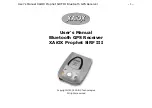
3
Connect the red wire to the positive terminal on the battery or
fuse block, and connect the black wire to the negative
terminal.
Power and Data Cable
• The wiring harness connects the device to power and NMEA
®
0183 devices. 6-inch devices can also use these wires to
share user data, such as waypoints and routes.
• If you are not connecting NMEA 0183 devices or another
chartplotter to share data, disregard the blue and brown
wires.
• The device has one internal NMEA 0183 port that is used to
connect to NMEA 0183 compliant devices.
• If it is necessary to extend the power and ground wires, you
must use 0.82 mm
2
(18 AWG) or larger wire.
• If it is necessary to extend the NMEA 0183 or alarm wires,
you must use .33 mm
2
(22 AWG) wire.
Item
Wire Function
Wire Color
NMEA 0183 internal port Rx (in)
Brown
NMEA 0183 internal port Tx (out)
Blue
Ground (power and NMEA 0183)
Black
Power
Red
Connecting to a Garmin Device to Share User Data
NOTE:
This feature is not available on ECHOMAP Plus 7x/9x
devices. The blue and brown wires on those devices can
connect to NMEA 0183 devices only.
You can connect the ECHOMAP Plus 6x device to a compatible
Garmin device to share user data, such as waypoints. If the
devices are mounted near each other, you can connect the blue
and brown wires. If the devices are mounted too far apart for the
wires to reach, you can connect the devices using a User Data
Sharing Cable (010-12234-06).
1
Make sure both devices are connected to the same ground.
2
Complete an action:
• If the devices are mounted near each other, connect the
blue wire from the first device to the brown wire of the
second, and connect the brown wire from the first device
to the blue wire of the second.
• If the devices are not mounted near each other, obtain a
User Data Sharing Cable (010-12234-06), and connect
the devices following the instructions included with the
cable.
3
On both devices, select
Nav Info
>
Manage Data
>
User
Data Sharing
.
User data is shared between the connected devices. If you
select Clear User Data, data is removed from both connected
devices.
Connecting the Device to a Transducer
Go to
Garmin dealer to determine the appropriate type of transducer
for your needs.
1
Follow the instructions provided with your transducer to
correctly install it on your boat.
2
Route the transducer cable to the back of your device, away
from sources of electrical interference.
3
Connect the transducer cable to the appropriate port on the
cradle.
Connecting the Cables to the ECHOMAP Plus 6x
Cradle
The connectors on the cables are keyed to fit only in the correct
ports on the ECHOMAP Plus 6x cradle. The connected cables
are held in place by a locking bracket.
1
Slide the cable locking bracket up from the bottom, and
remove the bracket from the cradle.
2
Compare the divots on each cable connector to the keying
on each port to determine which cable corresponds to each
port.
3
Fully and firmly insert each cable through a hole in the cradle,
and securely connect each cable to a port.
NOTE:
If the cables are not inserted far enough into the
cradle, the connectors may not connect securely to the ports,
and the device may appear to lose power or sonar or may
stop working.
4
Place the locking bracket over the cables, and slide the
bracket down to lock the cables in place.
There is an audible click when the locking bracket is installed
correctly.
Connecting the Cables to the ECHOMAP Plus 7x/9x
Cradle
The cables connectors fit only in the correct ports on the
ECHOMAP Plus 7x/9x cradle. The connected cables are held in
place by locking rings.
1
Insert each cable into the appropriate port in the cradle.
2
Spin the locking ring clockwise to lock the cable to the cradle.
Installing the Device in the Cradle
After the cables are connected to the cradle, you can quickly
place the device in the cradle.
1
Place the base of the device in the bottom of the cradle.
2
Tilt the top of the device toward the cradle until it fastens in
place.
There is an audible click when the device is secured in the
cradle.
NOTICE
You should make sure the device is firmly secured in the cradle.
If the model uses a locking bracket, make sure the bracket is
firmly snapped shut. There is an audible click when the device
or locking bracket is installed correctly. If the device is not firmly
secured, it can lose power. The device can also fall out of the
cradle and become damaged if it is not firmly secured.
Removing the Device from the Cradle
1
Press the release lever on the cradle until the device is
released.
3
























